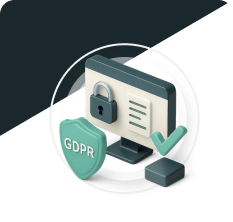Last Updated: April 21, 2025
GDPR compliance is more than just a legal requirement—it’s a commitment to protecting user privacy, improving security, and maintaining customer trust. Failing to comply can result in hefty fines and reputational damage, making it essential for all businesses handling user data to take proactive measures. This guide provides actionable steps to help align your website with GDPR requirements while reinforcing security best practices.

The General Data Protection Regulation (GDPR) is a comprehensive data protection law enacted by the European Union to safeguard personal data and uphold individual privacy rights. It applies to any organization that processes, stores, or collects data from EU residents—regardless of location.
While Sucuri does not provide legal advice, our security solutions help businesses protect personal data, prevent breaches, and meet GDPR security requirements.
GDPR compliance is an ongoing process—it requires continuous security improvements and
data protection best practices. Start securing your website today with Sucuri’s
industry-leading security solutions.
Explore Sucuri’s Security Solutions and take the next step toward compliance and data
protection.
Share
Trusted by Industry Leaders




